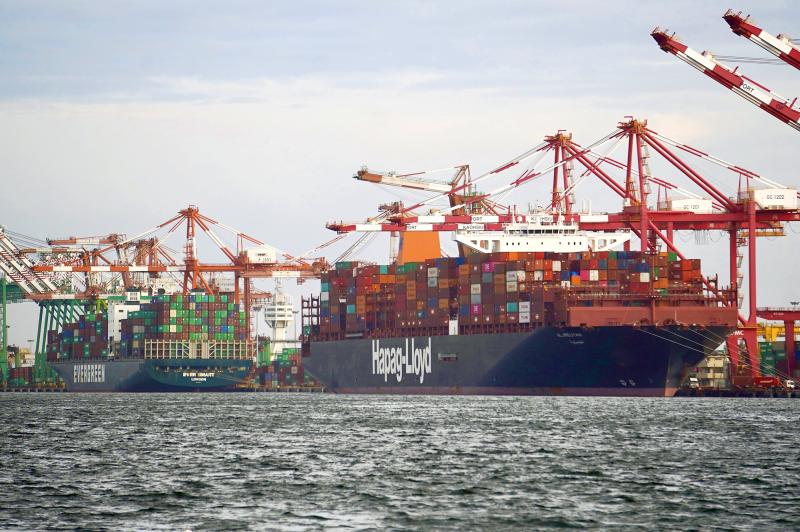Throughput at the nation’s major ports rose more than 6 percent to a new high last year, as exports soared on the back of solid global demand, the Directorate-General of Budget, Accounting and Statistics (DGBAS) said on Thursday last week.
Cargo handled at major international ports — such as Port of Kaohsiung, Port of Keelung, Port of Taichung and Port of Taipei — totaled about 750 million shipping tonnes last year, up 6.7 percent from a year earlier, agency data showed. Shipping tonnage is the measurement used to bill cargo handled by ports.
As the nation’s export performance improved last year, port throughput reversed a year-on-year 3.8 percent decline in 2020 and a 1.4 percent drop in 2019, the DGBAS said.

Photo: CNA
Riding a wave of strong demand for emerging technology products as well as raw materials as part of a global economic recovery amid the COVID-19 pandemic, Taiwan’s exports climbed to a record high, with annual growth of almost 30 percent.
The agency said that cargo loading volume reached about 308 million shipping tonnes last year, up 5.3 percent from a year earlier and accounting for 41.1 percent of total port throughput, while cargo unloading volume was about 442 million shipping tonnes, up 7.7 percent from a year earlier, making up 58.9 percent of the total.
The Port of Kaohsiung handled the largest volume of cargo last year with about 440 million shipping tonnes, which accounted for 58.6 percent of the nation’s total throughput, followed by the Port of Taichung (139 million shipping tonnes, or 18.6 percent), the Port of Taipei (89.67 million shipping tonnes, or 12 percent) and the Port of Keelung (65.46 million shipping tonnes, or 8.7 percent), the DGBAS said.
Last year, Taiwan’s major ports handled 552 million shipping tonnes of container cargo, up 6 percent from a year earlier and accounting for 73.6 percent of the total, the agency said.
Pipeline cargo, including crude oil and other liquefied items, reached 56.95 million shipping tonnes last year to make up 7.6 percent of total throughput, followed by coal (5.4 percent), iron sand (3.7 percent) and iron ore (3.1 percent).

KEEPING UP: The acquisition of a cleanroom in Taiwan would enable Micron to increase production in a market where demand continues to outpace supply, a Micron official said Micron Technology Inc has signed a letter of intent to buy a fabrication site in Taiwan from Powerchip Semiconductor Manufacturing Corp (力積電) for US$1.8 billion to expand its production of memory chips. Micron would take control of the P5 site in Miaoli County’s Tongluo Township (銅鑼) and plans to ramp up DRAM production in phases after the transaction closes in the second quarter, the company said in a statement on Saturday. The acquisition includes an existing 12 inch fab cleanroom of 27,871m2 and would further position Micron to address growing global demand for memory solutions, the company said. Micron expects the transaction to

Vincent Wei led fellow Singaporean farmers around an empty Malaysian plot, laying out plans for a greenhouse and rows of leafy vegetables. What he pitched was not just space for crops, but a lifeline for growers struggling to make ends meet in a city-state with high prices and little vacant land. The future agriculture hub is part of a joint special economic zone launched last year by the two neighbors, expected to cost US$123 million and produce 10,000 tonnes of fresh produce annually. It is attracting Singaporean farmers with promises of cheaper land, labor and energy just over the border.

US actor Matthew McConaughey has filed recordings of his image and voice with US patent authorities to protect them from unauthorized usage by artificial intelligence (AI) platforms, a representative said earlier this week. Several video clips and audio recordings were registered by the commercial arm of the Just Keep Livin’ Foundation, a non-profit created by the Oscar-winning actor and his wife, Camila, according to the US Patent and Trademark Office database. Many artists are increasingly concerned about the uncontrolled use of their image via generative AI since the rollout of ChatGPT and other AI-powered tools. Several US states have adopted

A proposed billionaires’ tax in California has ignited a political uproar in Silicon Valley, with tech titans threatening to leave the state while California Governor Gavin Newsom of the Democratic Party maneuvers to defeat a levy that he fears would lead to an exodus of wealth. A technology mecca, California has more billionaires than any other US state — a few hundred, by some estimates. About half its personal income tax revenue, a financial backbone in the nearly US$350 billion budget, comes from the top 1 percent of earners. A large healthcare union is attempting to place a proposal before